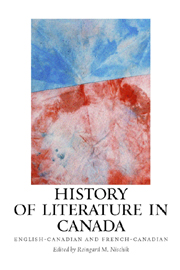Book contents
- Frontmatter
- Contents
- Acknowledgments
- Introduction: Writing a History of Literature in Canada
- I Beginnings
- II The Literature of New France, 1604–1760
- III The Literature of British Canada, 1763–1867
- IV From the Dominion to the Territorial Completion of the Nation, 1867–1918
- V The Modern Period, 1918–1967
- VI Literature from 1967 to the Present
- 21 Sociopolitical and Cultural Developments from 1967 to the Present
- 22 English-Canadian Literary Theory and Literary Criticism
- 23 The English-Canadian Novel from Modernism to Postmodernism
- 24 The English-Canadian Short Story since 1967: Between (Post)Modernism and (Neo)Realism
- 25 English-Canadian Poetry from 1967 to the Present
- 26 Contemporary English-Canadian Drama and Theater
- 27 Canons of Diversity in Contemporary English-Canadian Literature
- 28 Literature of the First Nations, Inuit, and Métis
- 29 The Quebec Novel
- 30 The French-Canadian Short Prose Narrative
- 31 French-Canadian Poetry from 1967 to the Present
- 32 Orality and the French-Canadian Chanson
- 33 Drama and Theater from the Révolution tranquille to the Present
- 34 Transculturalism and écritures migrantes
- 35 The Institutionalization of Literature in Quebec
- Further Reading
- Notes on the Contributors
- Index
34 - Transculturalism and écritures migrantes
from VI - Literature from 1967 to the Present
Published online by Cambridge University Press: 12 September 2012
- Frontmatter
- Contents
- Acknowledgments
- Introduction: Writing a History of Literature in Canada
- I Beginnings
- II The Literature of New France, 1604–1760
- III The Literature of British Canada, 1763–1867
- IV From the Dominion to the Territorial Completion of the Nation, 1867–1918
- V The Modern Period, 1918–1967
- VI Literature from 1967 to the Present
- 21 Sociopolitical and Cultural Developments from 1967 to the Present
- 22 English-Canadian Literary Theory and Literary Criticism
- 23 The English-Canadian Novel from Modernism to Postmodernism
- 24 The English-Canadian Short Story since 1967: Between (Post)Modernism and (Neo)Realism
- 25 English-Canadian Poetry from 1967 to the Present
- 26 Contemporary English-Canadian Drama and Theater
- 27 Canons of Diversity in Contemporary English-Canadian Literature
- 28 Literature of the First Nations, Inuit, and Métis
- 29 The Quebec Novel
- 30 The French-Canadian Short Prose Narrative
- 31 French-Canadian Poetry from 1967 to the Present
- 32 Orality and the French-Canadian Chanson
- 33 Drama and Theater from the Révolution tranquille to the Present
- 34 Transculturalism and écritures migrantes
- 35 The Institutionalization of Literature in Quebec
- Further Reading
- Notes on the Contributors
- Index
Summary
THE CONCEPT OF ÉCRITURES MIGRANTES, or migrant literature, first appeared in Quebec during the 1980s. The expression was and continues to be used today to refer to the literary production of writers who, after immigrating to Canada, decided to settle in Quebec — the only Canadian province with a francophone majority — and to write or at least publish within the framework of the province's literary institutions. The criteria for classifying a work as migrant literature vary from one source to another. For Daniel Chartier, author of the Dictionnaire des écrivains émigrés au Québec 1800–1999 (2003), language is not a determining factor. According to him, a work can be written in any of the two official languages of Canada, French or English, or, for that matter, in any idiom of a distinct linguistic minority (Italian, Spanish, Yiddish, etc.) that chooses to express itself in its mother tongue, and still be identified as migrant or, closer to the author's perspective, immigrant literature. On the other hand, the Dictionnaire des oeuvres littéraires du Québec (seven volumes published to date, encompassing the vast period from 1534 to 1985) still considers language as a discriminating factor, or even as the only valid criterion for distinguishing between Québécois and non-Québécois literary works. To be acknowledged as a “genuine” oeuvre from Quebec, the authors of the dictionary implicitly assume that the work must be written in French, considered not only the official language of Quebec, but also the only idiom in which a “true” Québécois (the former French Canadian as opposed to the English Canadian) expresses him- or herself.
- Type
- Chapter
- Information
- History of Literature in CanadaEnglish-Canadian and French-Canadian, pp. 497 - 508Publisher: Boydell & BrewerPrint publication year: 2008



